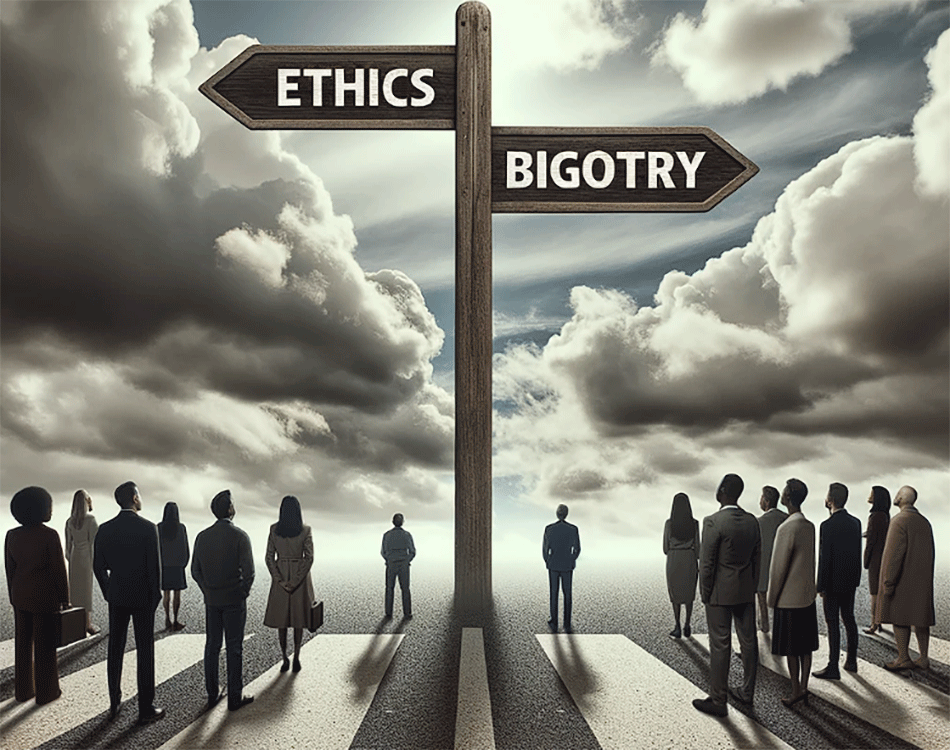Would you consider working for or hiring someone whose political or ideological convictions not only conflict with your own but also cause you personal offence?
Political and ideological beliefs have become defining characteristics of individual identity, often influencing not only personal relationships but also professional interactions. The rise of social media and the 24-hour news cycle have exacerbated these divisions, making it increasingly challenging to separate personal beliefs from professional responsibilities. This is especially true among younger generations, such as Gen Z, who are more likely to view their employment as an extension of their ethical and political selves.
The Geopolitical Context
Geopolitical conflicts and global tensions have a trickle-down effect on domestic workplaces. Employees may have strong opinions on international issues, which can create a charged atmosphere. This can be particularly problematic if the company has business interests or stakeholders in regions experiencing conflict, as this could lead to internal divisions and even boycotts.

Navigating Ideological Diversity In the Workplace
Companies can take several steps to navigate this complex landscape:
- Encourage Respectful Dialogue: Companies should foster a culture of trust and belonging where employees feel safe to express their opinions. This involves creating platforms for respectful dialogue and recognition.
- Invest in Education: Educational opportunities can help employees discover and listen to diverse ideas, thereby reducing polarisation. This could be in the form of workshops, seminars, or even online courses.
- Define Behavioral Expectations: Clear guidelines on acceptable behavior and conversations can help in managing sensitive topics. For instance, some companies use acronyms like “RESPECT” to outline their core values and behavioral expectations.
- Leverage Technology: Utilising platforms like Slack or Teams can help in creating safe spaces for employees to discuss and solve challenges collectively.
- Training in Diversity and Inclusion: Companies should invest in training programs that promote inclusive conversations and use of inclusive language.
- Provide Resources to Leaders: Equip leaders and HR teams with the resources to manage difficult conversations and to support an inclusive environment.
- Set Parameters for Political Discussion: While it’s impractical to completely ban political or social discussions, setting guidelines on what is acceptable can help in maintaining decorum.
- Promote the Idea of Respectful Disagreement: Employees should be reminded that it’s possible to disagree respectfully without causing conflict.
The Ethical Dilemma: Accommodating Bigotry?
When an employee is known and proven to have racist or misogynistic beliefs, the notion of diversity of thought encounters a more complex, contentious landscape. The conversation transitions from simple ideological differences to discriminatory attitudes that could foster a hostile work environment, infringe upon the rights and dignity of others, and pose legal and reputational risks to the organisation.
The presence of a known racist or misogynist within a workplace can severely impair the organisational culture, undermining the values of respect, inclusivity, and teamwork that are crucial for a conducive work environment. Morale, productivity, and engagement levels could plummet, especially if the discriminatory attitudes of the individual are not addressed appropriately.
Also, in an era where corporate social responsibility and ethical business practices are paramount, harbouring an employee with openly discriminatory beliefs could tarnish the reputation of the organisation. Heightened public scrutiny and consumer activism, often hold companies to high standards of ethical conduct, with their employment practices under the microscope.
The Double-Edged Sword of Diversity
When it comes to creativity and innovation, while diversity of thought is a recognised catalyst, discriminatory beliefs propagate a culture of intolerance, disrespect, and hostility. Such a culture is antithetical to the free exchange of ideas and the collaborative spirit necessary for creativity and innovation.
It’s vital to differentiate between diversity of thought arising from different life experiences, cultural backgrounds, or political ideologies, and discriminatory attitudes rooted in prejudice and bigotry. The former can be a rich source of creativity and innovation, fostering a vibrant, dynamic workplace culture. The latter, however, threatens to undermine the very fabric of respect, equality, and shared humanity that forms the bedrock of a civilised, progressive society, and by extension, a productive, harmonious work environment.
All text and images Copyright Grishma Jashapara
About the Author
 Grishma Jashapara is the Managing Partner at Fusion Associates, with a rich background in entrepreneurship, music management, and executive recruitment. Her expertise lies in spearheading senior appointments within the global fashion and luxury sectors, and writing on the big issues of today and tomorrow.
Grishma Jashapara is the Managing Partner at Fusion Associates, with a rich background in entrepreneurship, music management, and executive recruitment. Her expertise lies in spearheading senior appointments within the global fashion and luxury sectors, and writing on the big issues of today and tomorrow.






































